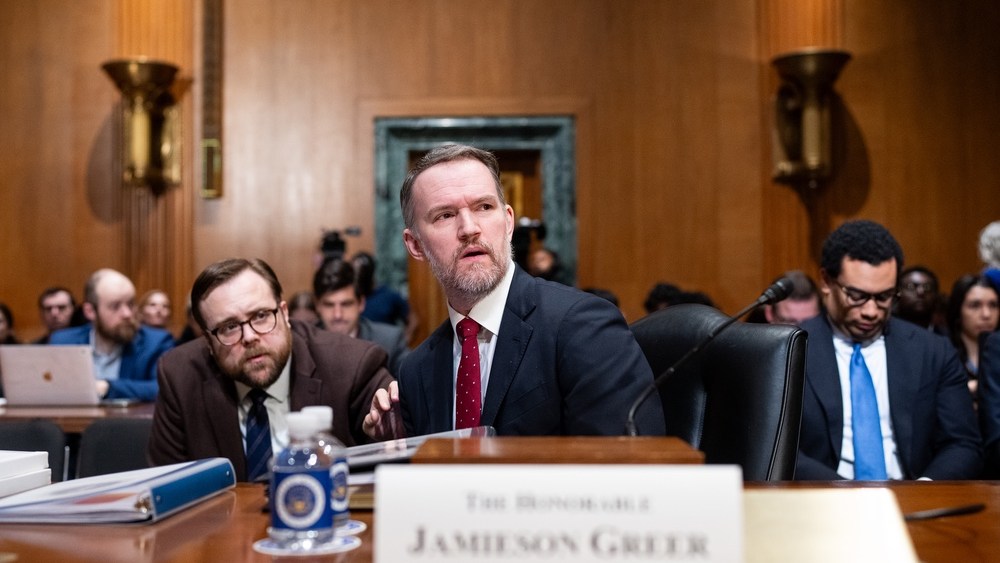
The Office of the United States Trade Representative commemorated National Textiles Day on Saturday with a grouse. Well, several grouses, to be more exact. All appeared to lay the ground for why the aggressive tariffs that have set off a trade war with China — and potentially others — have been necessary.
“USTR is calling out the unfair trade practices undercutting the American textiles and apparel sector,” the federal agency wrote in a multipart post on X that repeated the term “unfair” seven times.
Beijing, unsurprisingly, took the brunt of its ire. The office said the superpower’s nonmarket policies and practices in the textiles and apparel sector provide “unfair competitive advantages” to its domestic manufacturers by “enabling them to charge artificially low prices for their products.”
USTR cited the National Council of Textiles Organizations, a trade group that blames the closure of 28 U.S. textile mills over the past 22 months on the so-called de minimis “loophole” that until recently allowed for the duty-free entry of Chinese shipments valued at less than $800. With Shein and Temu alone likely responsible for more than 30 percent of all packages shipped to the U.S. under the exception, amounting to some 600,000 per day or 210 million a year, China-founded e-tailers are “flooding our market with cheap apparel products while bypassing tariffs and evading trade enforcement mechanisms,” the agency said.
But USTR also took aim at a longtime trading partner and ally in the form of the European Union, which President Trump had previously called “very, very bad to us” and had threatened with a 20 percent “reciprocal” tariff in April for not buying more American goods before abruptly announcing a 90-day delay. The EU, which was preparing to hit back with 25 percent taxes on many U.S. goods, also stood down.
What the office was mulling over that weekend, however, were nontariff barriers such as “onerous” eco-design requirements and “steep” extended producer responsibility fees that it said would “saddle U.S. exporters with burdensome compliance costs.” The complaint reflected a plea by Republican lawmakers for the White House to support the indefinite postponement of the implementation of the corporate sustainability due diligence directive, which is already being kneecapped by a proposed “omnibus package” by the European Commission to “cut red tape” and “simplify EU rules for citizens and business.”
The USTR also fired off at India, which it said used a mix of incentives, “unpredictable” import licensing requirements, high tariffs and “opaque” quality control rules to provide its domestic manufacturers with a competitive edge over U.S. textile and apparel manufacturers. It attacked Vietnam for its “aggressive” state-backed industrial policies and cheap workforce, Cambodia for “exploitative” labor conditions that artificially suppressed costs and Bangladesh for “pervasive” rights issues such as “insufficient fines for labor violations, poverty wages, 14- to 16-hour shifts in unsafe factories and systemic antiunion discrimination.” And Peru took a blow for “significant concerns” over freedom of association and collective bargaining.
But many of those grievances seem to run in opposition to the Trump administration’s defunding of U.S. Agency for International Development and Department of Labor programs that worked to address them.
In an op-ed published by the American Prospect in March, Katherine Tai and Julie Su, the USTR and Secretary of Labor under former U.S. President Joe Biden, wrote that “this is where the Musk-led cuts reveal the hypocrisy and incompetence of the administration’s approach to workers’ rights.”
Musk would be Elon Musk, the billionaire and putative head of the Department of Government Efficiency, or DOGE, which had pledged to slash $1 trillion from the federal budget only to fall conspicuously short.
“On the one hand, the Trump administration recognizes wage suppression abroad as a form of unfair competition, but on the other, they’ve cut the very agency that combats such wage suppression,” they said. “The cuts to DOL mean workers in the U.S. and workers abroad are more likely to suffer abuses. American businesses will lack the information they need to make informed decisions about sourcing and investment. American consumers will be more likely to unwittingly purchase products produced under inhumane conditions. American workers will be trapped in a destructive race to the bottom, suppressing wages everywhere.”
At a cabinet meeting last week, however, the mood was self-congratulatory.
“We saved $250 million by canceling ‘America Last’ — is what I call it — foreign handouts,” Secretary of Labor Lori Chavez-DeRemer said, claiming, without evidence, that DOGE found indications of fraud. “Including funding for things like transparency and accountability for the Uzbekistan cotton industry.”
“Some of these things are so ridiculous you can’t believe it,” Musk responded. “Uzbek cotton farmers? It sounds like a comedy sketch.”
‘Hit in the Gut‘
In a follow-up post on X, which Musk owns, USTR called “Made in America” an economic and national security priority. Trump’s trade actions, it said, are “ushering in a reshoring renaissance as companies pledge billions of dollars to expand U.S. manufacturing.”
“Reviving apparel production in America is not a pipe dream,” it added. “It was not that long ago we were manufacturing 56 percent of U.S. apparel in America.”
Kim Glas, president and chief executive officer of the National Council of Textiles Organizations, praised the USTR, led by Ambassador Jamieson Greer for “highlighting the challenges the U.S. industry has faced against unfair trade practices by China and other Asian countries,” which she said have utilized “any means at their disposal” to get a leg up on U.S. and global manufacturers. She praised, in particular, the removal of the de minimis exception for Chinese shipments that has already upended e-commerce.
“For decades, China’s predatory trade practices have allowed it to dominate the global textile markets,” Glas said. “Companies operating in these markets take advantage of nonmarket, predatory trade practices that include subsidized production, dumped exports, intellectual property theft, and in some cases purposely undervalued currencies, abhorrent labor abuses, and the use of unsustainable environmental practices. For the most part, certain Asian markets remain largely unopened to U.S. textile exports, allowing their manufacturers the luxury of operating behind closed domestic markets.”
But Steve Lamar, president and CEO of the American Apparel & Footwear Association, which represents names such as Adidas, H&M Group, Gap Inc. and J.Crew Group, along with Shein, said Trump’s trade machinations are misguided.
“While it’s true that only around 3 percent of apparel is manufactured in the U.S., that figure doesn’t tell the full story,” he said. “Today, the U.S. apparel, footwear and accessories industry directly employs 3.5 million American workers in design, research, marketing, distribution, retail, sales and manufacturing. These American workers push our industry and our country forward. What’s missing from the conversation is why production won’t move back to the U.S. at scale overnight: a lack of domestic infrastructure, vocational training, workers, materials and investment.”
“Made in the USA” businesses could end up getting hurt, too, if they’re “being hit in the gut” by rising tariffs, soaring input costs, shrinking export markets and declining consumer spending as a result of the trade turmoil, Lamar said.
“We support the goal of encouraging strong jobs in the American apparel and footwear industry, but tariffs are not the solution. Not for our 3.5 million American workers. And not for our U.S. manufacturers,” he said. “Call it a pipe dream, but we hope policymakers will protect the 3 percent of U.S. manufacturing that remains and take educated steps to reverse course so we can avoid shrinking it further.”
Eric Henry is the president of TS Designs, a “dirt to shirt” manufacturer in North Carolina that relies solely on domestic suppliers. He’s seen one mill after another shutter, forcing him to rejigger his supply chain over the years.. It used to be possible to make a T-shirt within one county. Now, production has to criss-cross several states.
Henry was also working with a Department of Energy grant to build a “dyehouse of the future.” With the federal grant freezes, he’s not sure where the money will come from. Every business he knows is on tenterhooks right now because the ground keeps shifting underfoot.
“Bringing apparel manufacturing back to the U.S. is a good idea, but that just takes time. You don’t just snap your fingers and boom, it happens,” he said. “Tariffs, if they’re done surgically to address a particular issue or problem, can be helpful. But when they’re broad stroke, like they are now, it just causes chaos and disruption.”
#USTR #Unfair #Trade #Practices #Undermining #U.S #Apparel #Textiles





